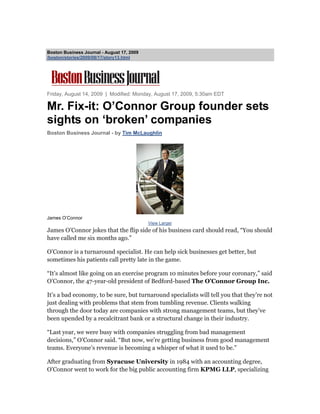
Boston Business Journal The Rockland Group
- 1. Boston Business Journal - August 17, 2009 /boston/stories/2009/08/17/story13.html Friday, August 14, 2009 | Modified: Monday, August 17, 2009, 5:30am EDT Mr. Fix-it: O’Connor Group founder sets sights on ‘broken’ companies Boston Business Journal - by Tim McLaughlin James O’Connor View Larger James O’Connor jokes that the flip side of his business card should read, “You should have called me six months ago.” O’Connor is a turnaround specialist. He can help sick businesses get better, but sometimes his patients call pretty late in the game. “It’s almost like going on an exercise program 10 minutes before your coronary,” said O’Connor, the 47-year-old president of Bedford-based The O’Connor Group Inc. It’s a bad economy, to be sure, but turnaround specialists will tell you that they’re not just dealing with problems that stem from tumbling revenue. Clients walking through the door today are companies with strong management teams, but they’ve been upended by a recalcitrant bank or a structural change in their industry. “Last year, we were busy with companies struggling from bad management decisions,” O’Connor said. “But now, we’re getting business from good management teams. Everyone’s revenue is becoming a whisper of what it used to be.” After graduating from Syracuse University in 1984 with an accounting degree, O’Connor went to work for the big public accounting firm KPMG LLP, specializing
- 2. on international clients such as Mercedes Benz in North America. But he soon found it was more rewarding professionally to fix something that was broken. He left KPMG for New York-based Alvarez & Marsal, a firm that specializes in corporate turnarounds. He struck out on his own in 1989. “I never thought I would be just a number cruncher. I always thought I would be an entrepreneur,” O’Connor said. He has worked with dozens of troubled companies, with annual revenue ranging from $3 million to $3 billion. Some of his engagements also have turned into full- time assignments, such as serving as the chief financial officer of Waltham-based Netegrity Inc. in the late 1990s. O’Connor served as a key architect in Netegrity’s transition from a catalog reseller to an Internet security software provider. Computer Associates later bought Netegrity in 2004 for about $453 million. When O’Connor was in his 20s, one of his first turnaround projects required he take the sputter out of a sputter target manufacturer. In the semiconductor industry, sputtering is used to deposit thin layers of a precious metal to boost computer chip performance. The sputter manufacturer in distress was a unit of Germany’s Hareaus Inc. Based in the New York City borough Queens, the company faced a shutdown before O’Connor arrived on the scene. He said he helped the company turn a profit and post growth that topped 200 percent. Recently, O’Connor said, he won a new client after he impressed them with his knowledge of sputtering. “They were telling me what they did, and I said, ‘You must sputter,’ ” O’Connor said. “I think I got the job right then.” As his firm approaches its 10-year anniversary, O’Connor said some things about the turnaround industry have not changed. For example, some business owners loathe the idea of asking for help, but only do so at the last minute. Another truism: Owners are astounded when an outsider can teach them something new about their businesses. O’Connor said an easy fix for a distressed company is getting rid of the unprofitable segments of their business. “You want to accentuate the positive,” he said. Bill Gately, principal of The Rockland Group Inc., agreed. His clients include tech manufacturing companies, and it’s not unusual for them to hold on to products that have been inactive for years.
- 3. “Sometimes you can be a profitable company at $22 million in revenue, but not at $30 million,” Gately said. Late last year, he talked to a lot of business owners who believed they could hold on even as the economy tanked and their companies struggled. “But then midway through the second quarter, a lot of companies said, ‘We can’t hold on,’ ” He said some of his clients say they want to sell their companies, but they really don’t. “They’re just frustrated,” Gately said. And it is not just an economic downturn they must contend with to survive. Component suppliers in the semiconductor industry, for example, can’t wait for orders from chip makers, Gately said. They have to remake themselves and find a new channel for their products and expertise. “Suppliers are really vulnerable. We’re working with a component supplier and getting them to do something with medical devices and other areas,” Gately said. O’Connor said the cost of turnaround advice is expensive, but he tells clients his services will provide more return than he charges. “That’s not a hard promise to make. We can do that,” he said. All contents of this site © American City Business Journals Inc. All rights reserved.